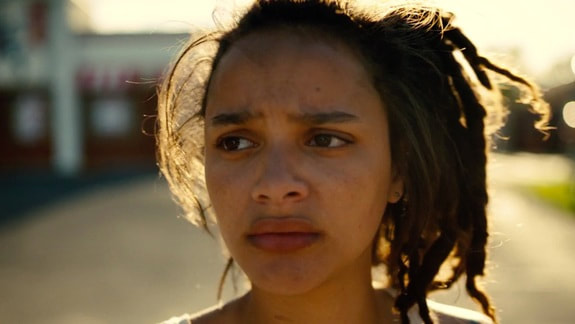Arnold’s great talent is in making her films feel tactile. This was palpably apparent in Wuthering Heights, where she was able to make every breeze and chill leap out of the screen, and that talent manifests itself in American Honey as well. Here, it’s the tiny gestures in conversations that Arnold’s collaborative cinematographer Robbie Ryan keeps finding, gestures that communicate the characters’ inner thoughts as ably as them saying them outright. An early conversation between Star and Nathan is riven with these furtive glances and unconscious tics, and Arnold doesn’t miss a thing. Whether this is so naturalistic because of the gifted cast or because of the relaxed atmosphere Arnold was able to maintain during filming makes little difference. The result is a lived-in film that could almost be a documentary. Frederick Wiseman following around a magazine crew sounds fantastic, or it would if Arnold didn’t effectively beat him to the punch.
As the audience surrogate through this world, Lane is an excellent guide. Star’s a shy newcomer, often relegated to watching her new coworkers go through their routines and their rituals, and her face is compelling and mysterious enough that many things could be flashing through her mind. Too earnest to go along with Nathan’s underhanded techniques, she distills the magazine scam into its purest essence: I’ll spend time with you in exchange for money that we both know is not going to land an issue of Guns and Ammo on your doorstep. Abolishing the lie allows her to get closer to her marks in a way that Nathan never could, while it also puts her in danger. She repeatedly climbs into cars with strange men, sometimes to grand connection and sometimes to an exchange of services. When presented with the chance to go door-to-door and sell to people in economic circumstances identical to hers, she refuses to engage, preferring to extract cash from people who aren’t in desperate need of it. The distinction between her and Nathan/Krystal is in that unwillingness, and it’s a level of empathy uncommon or long-discarded in her fellow scammers.
Much of the appeal of American Honey is in the main three performancesand Arnold’s bravura direction, but the casting must be acknowledged as well. The other crew members look and act the part, from the long-haired greaseball who introduces himself penis-first to the young woman who is surely in her 20’s but who looks like she could be in her 40’s. Krystal’s van is stuffed with teen boys growing their first scraggly beards and girls who probably smell like sunburns. They play with fireworks in parking lots and pass around pints of liquor during early van rides to their next location. Just as Arnold makes it seem that she cast directly from a magazine crew, that same verisimilitude extends throughout the film. Oil patch workers, flush with cash but lacking in places to spend it, look like the real things, as does a trio of white-clad ol’ boys cruising in their convertible. American Honey doesn’t have a single false note in it.
Arnold reinforces her reputation and her talents with American Honey, cementing herself as a consistently great filmmaker after the successes of Fish Tank and Wuthering Heights. I remain partial to the sensory experience of her Bronte adaptation, but her American debut has its considerable charms. The commitment to lived-in experience, and the occasional boredom that goes with it, means that the film lacks for big thematic flourishes. As a fly-on-the-wall envisioning of scraping by from town to town, American Honey’s sweet enough. B+

 RSS Feed
RSS Feed